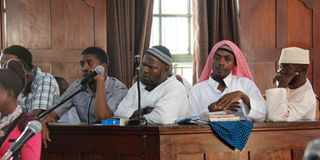Court dismisses petition by July 2010 terror suspects

The July 2010 terror suspects in Constitutional Court on Wednesday during the ruling on their petition challenging their prosecution in Uganda
What you need to know:
The judges also said that other complaints which included torture and illegal detention can well be addressed by the High Court after listening to both prosecution and the suspects
The Constitutional Court has dismissed a petition by the July 2010 terror suspects in which they were challenging their prosecution in Uganda.
Mr Edris Magondu and Mr Suleiman Hija Nyamandondo and nine other people alleged to be their accomplices had petitioned the court challenging the manner in which they were brought to Uganda from their countries, Kenya and Tanzania respectively, to stand trial. They say they were brought without extradition orders by a competent court.
Other suspects include Hussein Hassan Agade, Mohamed Adan Abdou, Omar Awadi Omor, Mohamad Hamid Sulaiman, Yahaya Sulaiman Mbuthla, Sulaiman Njoroge, Isa Ahmed Luyima, Hassan Haruna Luyima, and Abubaker Batematyo.
The suspects are accused of carrying out the July 11, 2010 twin bombings in Kampala which killed about 76 people and injured hundreds of others as football fans watched the World Cup finals at Kyadondo Rugby Club in Lugogo and Ethiopian Village Restaurant in Kabalagala.
In a four hours ruling on Wednesday the five justices of the Constitution Court have declined to release the suspects citing the gravity of the offence.
The judges led by the Acting Chief Justice Stephen Kavuma unanimously ruled, “This is a serious offence that was committed and releasing the group may impose a serious security threat to life and property of both here and abroad.”
Other justices included: Remmy Kasule, Solomy Bossa, Geoffery Kiryabwirwe and Lillian Tibatemwa.
However the judges cleared the Ugandan police of all the allegations raised by the suspects saying they(police) had no hand in their (suspects’) arrest from Kenya and Tanzania adding, “The two countries voluntarily arrested and surrendered the suspects to the police of Uganda.”
The judges also said that other complaints which included torture and illegal detention can well be addressed by the High Court after listening to both prosecution and the suspects.
The claims
The petitioners (suspects) had claimed ill-treatment by intelligence officers from Kenya, Tanzania, Uganda, USA and UK. They wanted court to declare their trial in Uganda unconstitutional.
Further, the suspects had said the Director of Public Prosecutions should not use their confession in the trial because the statements were extracted from them under duress.
Prosecution alleges that the group and others still at large, in Kampala unlawfully delivered and discharged explosives, to occasion death and serious injury.
Claim responsibility
Al-Shabaab, a Sunni Islamist militia based in Somalia that has ties to Al-Qaeda, claimed responsibility for the attacks as retaliation for Uganda’s support for troops under the Africa Mission in Somalia.
Most of the dead were Ugandans. Others included an Indian, an Irishman, a Lay missionary and one Kenyan. A US citizen was also killed. At least six Eritrean and one Ethiopian deaths were reported in the days following the attacks.
The injured also included six Methodist missionaries from a Pennsylvania church. Uganda has since been on high alert with a number of threats.


